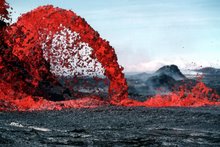Although I am frustrated that I cannot be running right now due to my stress fracture, and I completely respect anyone who has the patience, endurance and courage to do a marathon (let alone seven in one year!) I must say that after reading this article in the
Chicago Trib, I will be glad to be a spectator on Sunday rather than a runner :)Ten reasons to skip the Chicago Marathon
Running certainly has its charms: It can help clear your head, relieve stress, lift depression, trim fat, build bone strength and improve cardiovascular health.But like anything, overdoing it can wreak havoc on the body if you're not careful. (Unless you're as biologically gifted as Sam Thompson who stayed injury free as he ran
50 marathons in 50 days in 50 states).Here's what the runners in Sunday's 26.2-mile LaSalle Bank
Chicago Marathon can expect:
Muscle tears: When a muscle is damaged, an enzyme called creatine phosphokinase (CPK) pours into the bloodstream. The greater the damage, the more CPK ends up in the blood. Marathoners have been shown to have very high levels of CPK the week after a race-higher than what would show up in the blood after a gunshot wound or stabbing. Ouch! Knee pain: You get this from "training and ramping up the mileage, too much, too fast," said Northwestern Memorial Hospital sports-medicine specialist Greg Ewert, former medical director of the Chicago Marathon. Though running will not cause premature arthritis on "normal" knees, you're more at risk of developing symptoms if you run on an injury or have previously suffered a tear of the anterior cruciate ligament or a cartilage tear, said orthopedic surgeon Gregory Palutsis, section head for sports medicine at Evanston Northwestern Healthcare.Hip and back injuries: These are caused by repetitive shock absorption and can include legs and feet. "During running, the landing leg is typically loaded at three times the runner's body weight," said Mark Gorelick, an assistant professor in the department of kinesiology at San Francisco State University. "This load transmits through the striking heel, through the foot arch, then to the lower and upper leg to the spine." When a person is overweight, the extra mass causes an increase in the load on the joints with every step taken, throughout every single day.Heart: The risk of dying from a heart attack during a marathon is very small-about 1 in 50,000 runners-but studies have shown running can stress the old ticker. If the heart is traumatized, a protein found in cardiac muscle cells called troponin can show up in the blood, an indication that heart muscle cells have been destroyed. One study looked at 60 runners who had no signs of troponin in their blood before a marathon. Twenty minutes after the race, 60 percent of the group had elevated troponin levels, and 40 percent had levels high enough to indicate damage to some heart muscle cells. Most also had noticeable changes in heart rhythms. In addition, healthy men over 50 who had finished at least five marathons in the last five years have been shown to be more likely to have major calcium deposits in their arteries than healthy men who did not run as much. Calcium buildup is a sign that arteries are hardening, even when patients lack other symptoms. Jogger's nipple: This embarrassing, bloody mess usually strikes men; it's a friction burn caused when the T-shirt chafes the nipple. It's worse in cold, wet conditions. Wearing mesh, rather than cotton, and applying petroleum jelly to the nipples and covering them with adhesive bandages can help prevent it.Black toenails: Repetitive pressure on the nail plate, either by digging into the sock liner or rubbing against the top of the toe box causes a "ruising"at its attachment under the skin at the cuticle. The microscopic attachment then rips away, and the blood drains forward under the nail plate, said sports medicine doctor Stephen Weinberg of the Weil Foot and Ankle Institute, who is running the Chicago marathon with his daughter Lindsay this year, after serving as the race' Chief of Podiatry for two decades. Blisters and toe lacerations: Blisters, the most common injury, can occur under the toenail or on the feet. They’re caused by friction. If your toenails are too long, excessive rubbing will cut the tissue of the adjacent toe. Skin cancer: Training under the sun's ultraviolet radiation can give marathon runners an increased risk for malignant melanoma and non-melanoma skin cancer, according to a study in the Archives of Dermatology. Sweating also can contribute to UV-related skin damage, because it increases the photosensitivity of the skin, increasing the risk of sunburns. Meanwhile, intense endurance exercise and tissue trauma could also suppress the immune system, a phenomenon called exercise-induced immunosuppression. The study found that the suspicious moles and liver spots were more pronounced in those with more intense training regimens. Hyponatremia: Drinking too much water can be as dangerous as not drinking enough. Some research suggests that when you overhydrate, the body, seeking to keep a balance of salt and water levels between the blood and tissues, begins to draw water out of the blood, leading to puffiness in the skin and swelling in the brain. The brain responds to the pressure by sending an emergency distress call to release water into the lungs. The lung fluid, or the brain pressure, eventually kills you.Night blindness: It's rare, but ultrarunner and biological freak of nature Dean Karnazes once temporarily lost his vision at Mile 85 of the 100-mile Western States Endurance Run. His body lost the ability to produce a chemical compound called rhodopsin, a pigment of the retina that enables night vision. Low blood pressure or exposure to bright light during the day can affect the body''s ability to produce rhodopsin. It takes about 30 minutes to regenerate. Karnazes, of course, finished the race.




